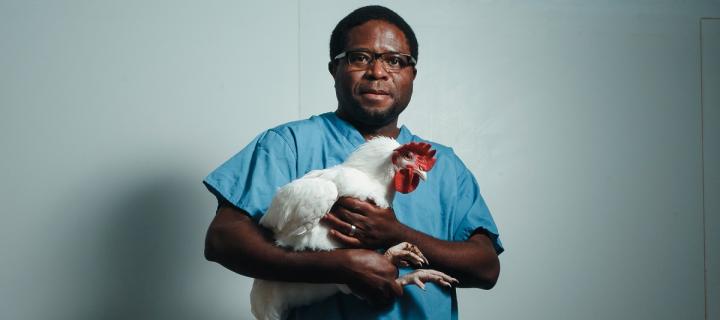Turning livestock into a pathway out of poverty
A new centre has received backing to achieve its aim to improve the health and productivity of poultry and cattle in developing countries.

Philanthropist Bill Gates visited the University in January 2018 for an event showcasing Edinburgh’s research to improve the health and productivity of livestock for vulnerable farmers around the world.
Some 200 people gathered on a crisp January morning to hear from the tech billionaire, who was joined by UK International Development Secretary Penny Mordaunt.
Addressing the audience, Mr Gates explained the reason for the visit: “We believe that the innovations being developed here can help turn livestock into a pathway out of poverty for hundreds of millions of people.”
A hub for tropical farming research
Nestled beneath the Pentland Hills, surrounded by grazing sheep and cattle, Edinburgh’s Royal (Dick) School of Veterinary Studies campus houses the world’s largest concentration of animal scientists, including The Roslin Institute.
The campus first came to Mr Gates’ attention in 2015 during a learning visit – a series of private meetings to explore how Roslin’s science might align with his charitable foundation’s aims. As a result of that visit – and driven by the vision of former Roslin Director, Professor David Hume – a new Centre was created.
The Centre for Tropical Livestock Genetics and Health – an alliance between the University, Scotland’s Rural College and the Africa-based International Livestock Research Institute – was launched with £10 million backing from the Bill and Melinda Gates Foundation. A further £4 million investment from the Department of International Development was announced at the event in January.
Professor Appolinaire Djikeng, Director of the Centre for Tropical Livestock Genetics and Health, explains: “We’re aiming to leverage technologies and innovations that have been successful in advanced economies, as well as cutting-edge research outputs, and apply them in less developed tropical production systems.
“In the UK cattle and sheep industries, for example, genetic tools are routinely available to breeders and farmers, helping them to improve the health and productivity of their stock. We don’t have that in many low- and middle-income countries at the moment and the ambition is to change this.”
Disease is a major problem. Herds are routinely decimated, with huge animal welfare implications and devastating consequences for the farmers and communities that rely on them.
Another problem is that hardier breeds adapted to warmer climates are often not the most productive. While breeds that have been selected over centuries for their bountiful productivity often fare poorly in dry, arid and disease-prone conditions. A typical cow in Africa produces around ten times less milk than a typical British cow.
Finding the right tools
At the new Centre, teams are developing genomic tools and associated resources to improve tropical livestock productivity – such as milk yield, growth, meat and egg production – in breeds used in tropical production systems.
Researchers are exploring the genetic diversity of chicken breeds and carrying out performance analysis to identify birds that thrive in tropical environments, such as heat and altitude.
When they find an animal that consistently performs well, they collect biological samples and performance data to find out what sets that individual apart from others that do not. All of this information can be used to develop tools to identify the best animals to breed from.
The teams eventually hope to use gene-editing techniques to produce animals with desired characteristics. This technology has the potential to speed up the selective breeding process, such that gains that have been made in the West over several decades could potentially be achieved within 10 years.
I wanted to move away from blue sky research and work on something that will have a direct impact on improving human health and agriculture in Africa.
It is a very personal mission for Professor Djikeng, who originates from Cameroon. He spent more than 10 years forging a successful scientific career in the US before being drawn back to Africa and now to this role.
“I wanted to move away from blue sky research and work on something that will have a direct impact on improving human health and agriculture in Africa," he says. “I feel fortunate to be in this role, not least because Edinburgh is one of the best universities in the world, but because there is a long history of mobilizing UK scientific excellence for international development.”
Towards a sustainable future
Next year marks the centenary of the Animal Breeding Research Department at the University. Some of the earliest breeding experiments were carried out in fields on the outskirts of the city. Today, the University’s veterinary and agricultural research is ranked top in the UK, underpinned by decades of investment from the Biotechnology and Biological Sciences Research council.
Professor Eleanor Riley, Director of The Roslin Institute, believes Edinburgh is the only place in the world that can deliver on Mr Gates’ strategic aims: “The breadth and depth of animal science we have is unrivalled. We can carry out fundamental research into the biology of animals, as well as sophisticated genetic analysis, and produce gene-edited animals all on one site.”
“Our aim is to enhance animal productivity, health and welfare,” she explains. “Healthier animals are not only more productive, they’re better for the environment. Reducing waste, minimising greenhouse gases and preventing environmental degradation are just as important as increasing yields if livestock farming is to have a sustainable future as a pathway out of poverty.”
Video
Bill Gates talks about why his Foundation has funded research at Easter Bush.

